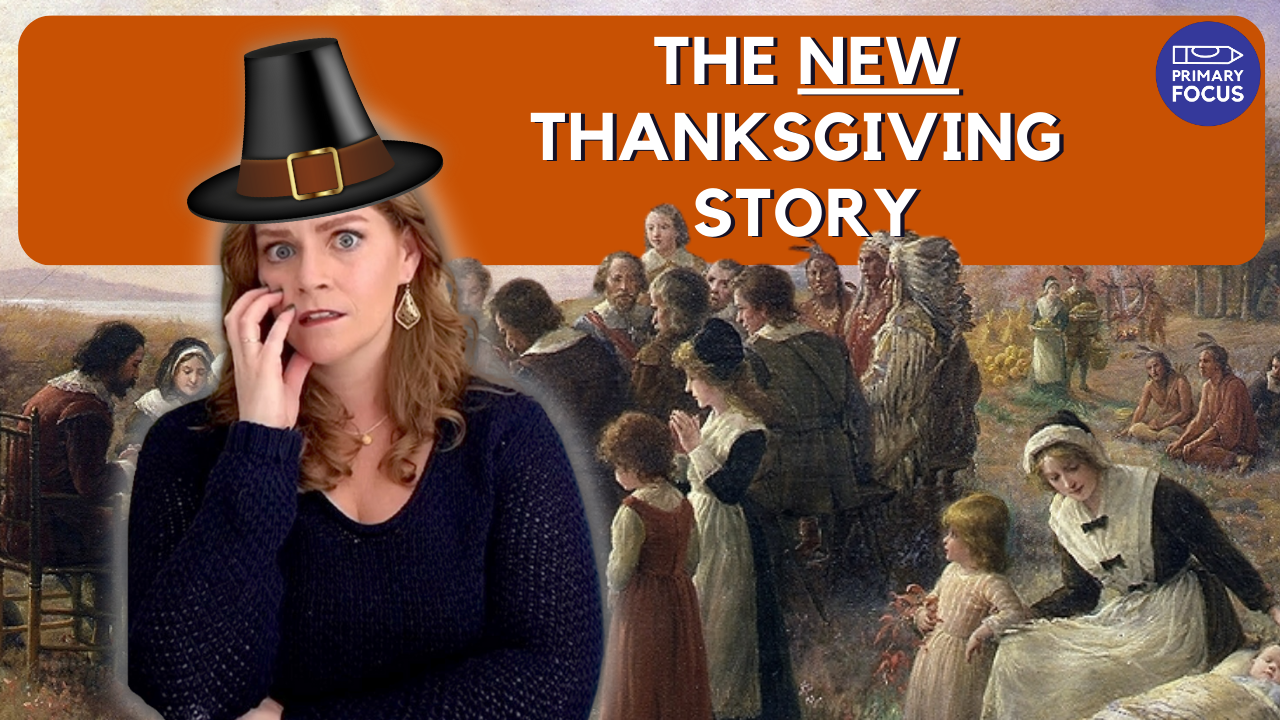How to Talk to Children About Thanksgiving
The story of Thanksgiving is outdated and inappropriate. Here's a modern way to teach children about Thanksgiving for all ages.

Transcript:
Hey, it's Natalie and welcome back to Primary Focus. I am so glad you're here for this special Thanksgiving edition. Something's been on my mind and it's the story of Thanksgiving.
As a kid, I was fed these stories about the pilgrims coming over and the American Indians and them sharing this beautiful day together.
And I think most American children are fed some version of this story, but as time has gone on, we've realized that American Indians were not treated well at all. And this story is a sugar coated moment in time that has been taken so far from actual reality, that there's not a lot of truth left to it at all.
Now that we are the adults in the room, I feel really icky around Thanksgiving time, especially because I was a teacher and, I like to teach the background and history of holidays to my students.
Each year I stumbled upon this and picked different things to focus on. Keep in mind, most of the years I taught, my children were 5, 6, and 7 years old. we weren't even studying that type of history to begin with. So their background knowledge to lead up to the information that maybe wasn't so pleasant, it felt like I was trying to squeeze a lot into 20 minutes of social studies.
This is on my mind a lot, and I can tell it's on your mind too. When I reached out to my followers on Instagram and on YouTube to ask if they would like to hear a video about the modern way to talk about Thanksgiving, it was a resounding yes from people.
I heard from a lot of you that you also feel really icky when it comes time to talk about Thanksgiving, but you've been grasping at straws about the way to talk to children about this. So I did some deep diving for you. I looked at a lot of research, I looked at lesson plans, I looked at what experts are saying about how to teach children about Thanksgiving.
I have a lot of links below that can help you break down what age appropriate ways to talk about this, interesting texts to read with your children. I really encourage you to deep dive on this topic the way that I did too.
But before I really get into this, I want you to know I am not perfect. Talking about history, especially when you're working with oppressed groups and untangling cultural stereotypes, is difficult. I'm American. I'm white. English was my first and only language. I'm one of those people who can trace their lineage back to the Mayflower.
I do my best, but I am learning, and this history is new to me. It is different than what was put in my head when I was a child. But the goal is not to be perfect. The goal is to always be improving. So if you've got ways that I can improve or suggestions to share, please comment below on this video. Let's start a little bit of dialogue on the modern way to teach our children about Thanksgiving.
Let's start with some important background about Thanksgiving. The very first thing that you should know is that Thanksgiving is a concept that is not unique to the United States. It is currently celebrated by eight different countries plus some specific towns and territories, and traditionally means a religious day of prayer.
It's a recycled concept that the United States took on.
The second thing that you should know is Thanksgiving is changing and it has changed a lot over time.
The first Thanksgiving was held in autumn 1621, and it was considered to be an autumn harvest celebration. It was not called Thanksgiving, and we did not hear that term until well over a hundred years later.
Not even in the written accounts of Thanksgiving did they use that term.
I'm telling you this now because if you just want to skip the story of Thanksgiving and get the pilgrims out of here, I don't think anyone that actually attended that dinner would be offended.
The first time we hear the word Thanksgiving in our country is after the Revolutionary War in 1789. The Continental Congress designated a Day of Thanks and George Washington stepped in and designated a date. Over the years, presidents continued this tradition, but the date was not consistent and I don't even think they consistently celebrated it.
It was sort of a spontaneous holiday that the president would announce in October when they were celebrating it.
However, some decades later, in 1863, during the height of the Civil War, Abraham Lincoln called for a day of thanksgiving and prayer. This was considered the real beginning of Thanksgiving as an American holiday. I find interesting here is so far the two times Thanksgiving has become prominent is during or right after major wars.
These are times of reflection and rebuilding.
And then something else here that I want to note just thinking about as we get into the Thanksgiving that we start to know today is that there was major American nostalgia in the 1970s. 1976 marked the Bicentennial of the United States.
And there was a ton of nostalgia back then. It's actually kind of a fun deep dive, but America was all in on colonialism, a lot of colonial design that we see actually came from the 1970s when people were gearing up for the bicentennial. If you look back, a lot of Thanksgiving books, movies, specials that we watch were made in the 1970s, and not a lot of new things have been made since.
Right around the same time though is when American Indians tribes got together and they had an un Thanksgiving and started to protest the story that was being told, and remember the atrocities that happened to American Indians.
So at the same time we were starting to see all of these fun kids specials about thanksgiving stories, we're also seeing a backlash as well. I'm starting to wonder if this is why we have not seen a lot of modern takes on the thanksgiving story, and these things from the 1970s just continue to permeate thanksgiving kids culture.
And now we can change our thoughts about Thanksgiving again to reflect our beliefs and values.
And so one thing to really consider is that no matter how Thanksgiving has taken shape over the hundreds of years, it is a value based holiday. And this is one of the reasons why Thanksgiving is my favorite holiday. Despite its religious background and origins, it is not a religious holiday in the United States.
It's a patriotic holiday. I'm American and I love a reason to celebrate my country. I don't want to hide all of the terrible things my country has done.
But that doesn't mean I can't love my country and hope that it can be better in the future. It's also value based. Some of the values that come to mind when I think of Thanksgiving are family, gratitude, kindness, charity, and reflection.
I also love Thanksgiving because you don't give gifts on it. Yes, it is expensive to put on a Thanksgiving dinner and possibly be traveling, But of the holidays where you expect people to come together, I love that it's not based around gift giving and having valentines and presents under the trees.
It's just like, hey, let's spend some time together. I really like that.
ultimately, this is where your focus should be coming from in Thanksgiving. Especially the values based part. What does this holiday mean to you? What values do you want your children to pull from Thanksgiving? I also want to mention here, if when you think of Thanksgiving, you think about how annoyed you are cooking everything yourself and you're stuck in the kitchen, maybe it's time to rewrite that part of the holiday too.
We don't need to just keep doing things because we've been doing them. There should be enjoyment to them as well. I hate it when a holiday is supposed to be about togetherness and then the host just becomes an indentured servant.
Alright, alright. So we've got the values, we've got the background, but let's actually talk about the story. What do we want to tell our kids? I'm going to be reading off my notes here just to make sure I kind of get all these details. What I'm reading is adapted from a few stories, but in particular the Harvest Study Guide. Which was really awesome. If you have a child that's maybe fourth, fifth grade and up, it could be a really interesting document to read to them or read aloud to them as well. As I read this, you might notice I'm speaking in kind of simple language. I think you can pick and choose here based on your child's age, how much time you have to talk about this, and their background about American history.
first things first though, we're not going to call them pilgrims anymore. We're going to call them Settlers, separatists, or the English. And we're not saying Indians anymore, if you know a tribe's name, call them by their tribe's name.
So let's start off, let your child know it was really difficult to survive back then. Everyone needed land and fresh water to grow food. And before the settlers came, there were already many tribes in the areas. Some, like the Wampanoag and the Narragansett, were enemies. Note here, I have read both Wampanoag and Wampanoag. So they were enemies, and they divided up the land and sometimes fought over the land, and the land was called a nation, just like how we call countries today nations. It was a scary and difficult time back then. It might look interesting in movies, but life was really, really difficult. When the settlers arrived, they were interrupting nations that already existed, and they had to take land from tribes so that they could set up their town.
They were not nice about this. They tried to scare and kill these tribe members. They were not asking for the land. They were taking something that was not theirs.
But then a very sad and special circumstance happened. One nation, the Wampanoag, was really struggling. They used to be very powerful, but then a plague struck them. Note here, if you want to go in and explain that the plague came from European explorers a few years prior to the Mayflower arriving, you can do that.
They did not have medicine back then, so if a bad germ got you, you were probably going to die. And they were seeing entire towns dying off. In The Narragansett, who was their enemy before, wanted to take advantage of this and take their land because they were so weak and so many of them had died.
The settlers arrived at an interesting time when this was happening. The Wampanoag teamed up to help each other. There was one man named Tisquantum. You may hear him called Squanto in some stories. Tisquantum knew how to speak English. He showed them how to plant farms, how to set up their village, and safe places to live.
Most of the seeds that the settlers brought from Europe actually would not grow in America, so he shared corn seeds with them too. This partnership was helpful because the settlers helped protect the Wampanoag from other tribes.
The Wampanoag helped keep the settlers alive and start their own town.
After one year of partnership in fall 1621, the settlers had a successful harvest. They had a three day festival to celebrate. Now, I've read conflicting accounts if American Indians were invited or if they heard the party and went over, but regardless, it was a big celebration and both parties attended and seemed like they had a great time.
They ate lots of food, shot their muskets in the air, and drank lots of beer. The barley harvest went well. It was not called a Thanksgiving at that time, but it certainly was a celebration. And they would not have called it Thanksgiving because Thanksgiving was considered a day of prayer. This was a fun couple days of games and good food to eat.
This relationship was very special, but also very rare. The settlers were usually unkind to American Indians, and even in later years were unkind to the Wampanoag, who were supposed to be their friends. But for this one special event, they got together and they ate food. And then ultimately massacred them.
So that's our story of Thanksgiving. You can get as deep into this as you want or just keep it on the surface level, but I think it's important to explain that this was a very special partnership. It did not last, but we try to remember this one special time. You might also want to say that we are remembering the sacrifice from the Wampanoag people and other tribes. And then also explain Thanksgiving is tied back into the values that you've chosen as a family and that's what you're really celebrating today.
Let's get into the portrayal of American Indians and settlers. No matter how we approach it, no matter if you want to talk about the story or not with your family, we need to stop the pilgrims and Indians thing, okay? There are so many better crafts than making a cultural appropriation hat for your kid. the problem is this. The settlers clothing has gotten to evolve and change over time. They don't dress that way now.
It was cultural garb for that time period. Now we see those same settlers dressed as white people in modern day clothing. American Indians have not been treated as kindly in the media, and the way we see them only portrayed in these clothes continue stereotypes that need to be broken. The good news is this is something that even a small child can grasp, and this is something I really focused on when I talked about Thanksgiving with my kindergartners.
The first thing that I would explain when we talked about Thanksgiving is that when we see pictures of the Wampanoag, Narragansett, and other American Indians in Thanksgiving books and movies they are wearing clothes from the olden days.
If we ran into a Wampanoag person at Walmart, they'd be wearing clothes just like us. Maybe if it was a special occasion we would see them in cultural clothing, but they go to school, they live inside, they have jobs, they drive cars around just like most of the other people that we know. If your child has cultural clothing or maybe some sort of a uniform that they wear sometimes, they can probably easily make a personal connection to this too.
Ultimately, no matter how you want to talk about Thanksgiving with your family, there's two really important pieces here. The first is how we are representing the Wampanoag and the settlers in our stories, and the second is the values that you want to focus on. Thanksgiving has evolved and changed a lot over the years, and I think we are in a phase where we can let this evolve even more and reflect our current society and values.
So now I want to hear from you. How does your family celebrate Thanksgiving? Is there a specific story or way that you talk about Thanksgiving's past? Let me know in the comments below. Thanks for watching Primary Focus. My name's Natalie. See you next time.

